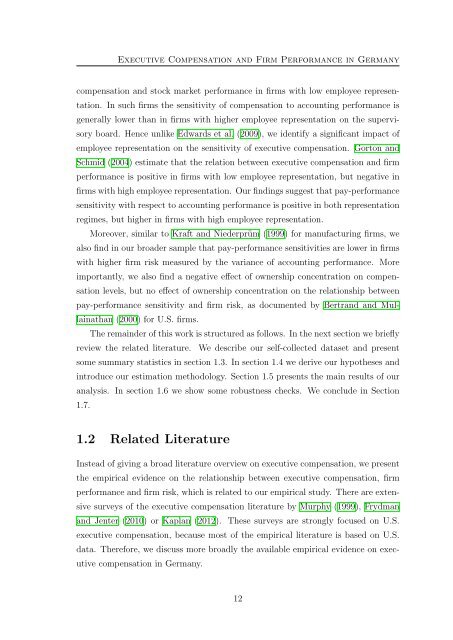Three Essays on Executive Compensation - KOPS - Universität ...
Three Essays on Executive Compensation - KOPS - Universität ...
Three Essays on Executive Compensation - KOPS - Universität ...
Create successful ePaper yourself
Turn your PDF publications into a flip-book with our unique Google optimized e-Paper software.
<strong>Executive</strong> Compensati<strong>on</strong> and Firm Performance in Germany<br />
compensati<strong>on</strong> and stock market performance in firms with low employee representati<strong>on</strong>.<br />
In such firms the sensitivity of compensati<strong>on</strong> to accounting performance is<br />
generally lower than in firms with higher employee representati<strong>on</strong> <strong>on</strong> the supervisory<br />
board. Hence unlike Edwards et al. (2009), we identify a significant impact of<br />
employee representati<strong>on</strong> <strong>on</strong> the sensitivity of executive compensati<strong>on</strong>. Gort<strong>on</strong> and<br />
Schmid (2004) estimate that the relati<strong>on</strong> between executive compensati<strong>on</strong> and firm<br />
performance is positive in firms with low employee representati<strong>on</strong>, but negative in<br />
firms with high employee representati<strong>on</strong>. Our findings suggest that pay-performance<br />
sensitivity with respect to accounting performance is positive in both representati<strong>on</strong><br />
regimes, but higher in firms with high employee representati<strong>on</strong>.<br />
Moreover, similar to Kraft and Niederprüm (1999) for manufacturing firms, we<br />
also find in our broader sample that pay-performance sensitivities are lower in firms<br />
with higher firm risk measured by the variance of accounting performance. More<br />
importantly, we also find a negative effect of ownership c<strong>on</strong>centrati<strong>on</strong> <strong>on</strong> compensati<strong>on</strong><br />
levels, but no effect of ownership c<strong>on</strong>centrati<strong>on</strong> <strong>on</strong> the relati<strong>on</strong>ship between<br />
pay-performance sensitivity and firm risk, as documented by Bertrand and Mullainathan<br />
(2000) for U.S. firms.<br />
The remainder of this work is structured as follows. In the next secti<strong>on</strong> we briefly<br />
review the related literature. We describe our self-collected dataset and present<br />
some summary statistics in secti<strong>on</strong> 1.3. In secti<strong>on</strong> 1.4 we derive our hypotheses and<br />
introduce our estimati<strong>on</strong> methodology. Secti<strong>on</strong> 1.5 presents the main results of our<br />
analysis. In secti<strong>on</strong> 1.6 we show some robustness checks. We c<strong>on</strong>clude in Secti<strong>on</strong><br />
1.7.<br />
1.2 Related Literature<br />
Instead of giving a broad literature overview <strong>on</strong> executive compensati<strong>on</strong>, we present<br />
the empirical evidence <strong>on</strong> the relati<strong>on</strong>ship between executive compensati<strong>on</strong>, firm<br />
performance and firm risk, which is related to our empirical study. There are extensive<br />
surveys of the executive compensati<strong>on</strong> literature by Murphy (1999), Frydman<br />
and Jenter (2010) or Kaplan (2012). These surveys are str<strong>on</strong>gly focused <strong>on</strong> U.S.<br />
executive compensati<strong>on</strong>, because most of the empirical literature is based <strong>on</strong> U.S.<br />
data. Therefore, we discuss more broadly the available empirical evidence <strong>on</strong> executive<br />
compensati<strong>on</strong> in Germany.<br />
12
















